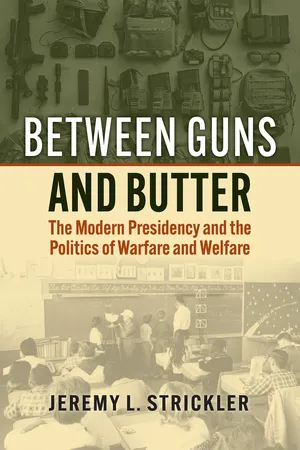
Between Guns and Butter
The Modern Presidency and the Politics of Warfare and Welfare
- English
- ePUB (mobile friendly)
- Available on iOS & Android
Between Guns and Butter
The Modern Presidency and the Politics of Warfare and Welfare
About this book
An illuminating study of how foreign and domestic policies have reinforced each other in post–New Deal presidencies.
Studies of presidential leadership tend to separate foreign and domestic policymaking as discrete avenues of inquiry, both empirically and analytically. This “two presidencies” syndrome has especially afflicted the study of the modern presidency. In Between Guns and Butter, Jeremy Strickler breaks this mold and simultaneously examines two significant developments that have shaped the leadership imperatives of the institution: the rise of the national security presidency and the emergence of the executive as steward of the public welfare. Strickler calls this pattern of governance the “warfare-welfare nexus.”
Analyzing the administrations of Franklin D. Roosevelt, Harry S. Truman, Dwight D. Eisenhower, John F. Kennedy, and Lyndon B. Johnson, Strickler shows how each, under the pressure of emergencies both at home and abroad, navigated their governing environment by expressing ideas on the tradeoffs between guns and butter through the articulation of “visions of national strength.” FDR directly linked his New Deal programs to national security and defense preparedness, not only through the Social Security Act but also through rhetoric that framed his policy initiatives as efforts to mobilize national strength at home. Truman similarly connected his Fair Deal program to national security in the face of the Korean War, under the assumption that social welfare and national defense were “one package.” While Eisenhower placed greater emphasis on foreign policy, his vision of an economy-security nexus led him to promote federal funding for education as the domestic foundation for fighting the Cold War. Kennedy linked the needs of the economy with Cold War national security, yet advocated more vigorously for unleashing economic growth as a source of national strength. Johnson’s commitments to both his Great Society program and an escalation of the Vietnam War—obscuring the relationship between guns and butter—proved unsustainable, representing the unraveling of the warfare-welfare nexus.
By juxtaposing American domestic and foreign policies, Strickler’s study sheds new light on twentieth-century presidential history.
Frequently asked questions
- Essential is ideal for learners and professionals who enjoy exploring a wide range of subjects. Access the Essential Library with 800,000+ trusted titles and best-sellers across business, personal growth, and the humanities. Includes unlimited reading time and Standard Read Aloud voice.
- Complete: Perfect for advanced learners and researchers needing full, unrestricted access. Unlock 1.4M+ books across hundreds of subjects, including academic and specialized titles. The Complete Plan also includes advanced features like Premium Read Aloud and Research Assistant.
Please note we cannot support devices running on iOS 13 and Android 7 or earlier. Learn more about using the app.
Information
Table of contents
- Front Cover
- Half Title
- Title Page
- Copyright Page
- Table of Contents
- Acknowledgments
- List of Figures
- Introduction
- 1. The New Deal as National Defense: The Roosevelt Administration During World War II
- 2. Building Strength at Home: Truman’s Fair Deal from Reconversion to the Korean War
- 3. Economy as Strength: Eisenhower, the Cold War, and New Deal Liberalism
- 4. The New Frontier in “An Atmosphere of Peril”: Kennedy, Economic Growth, and the Domestic Politics of Cold War Strength
- 5. The Collapse of Guns and Butter: Lyndon Johnson, the Great Society, and Vietnam
- Conclusion
- Notes
- Bibliography
- Index
- Back Cover